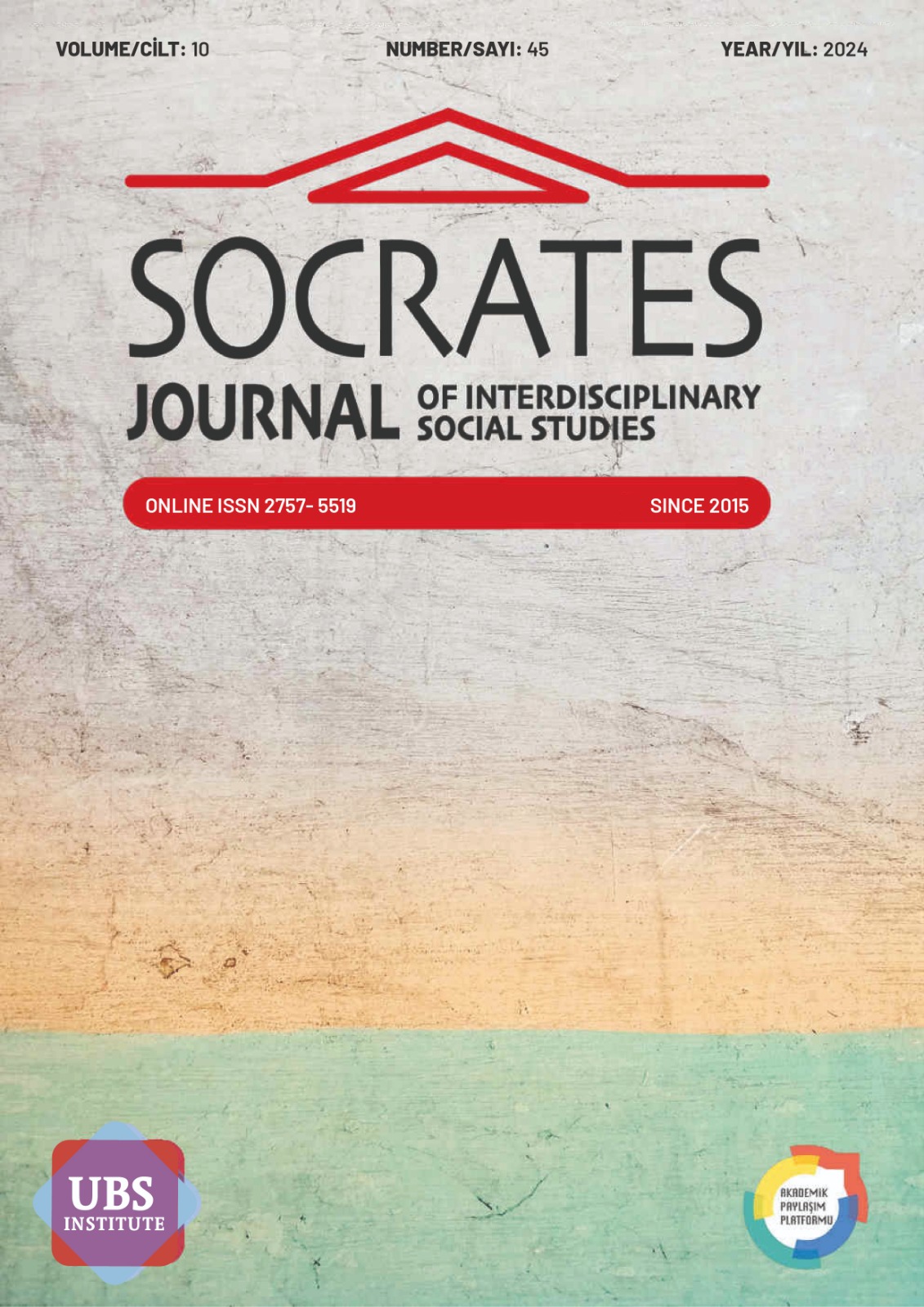EĞİTİMDE YENİ BİR DÖNEM: YAPAY ZEKÂ DESTEKLİ ÖĞRENME ORTAMLARININ POTANSİYELİ
A NEW ERA IN EDUCATION: THE POTENTIAL OF ARTIFICIAL INTELLIGENCE SUPPORTED LEARNING ENVIRONMENTS
DOI:
https://doi.org/10.5281/zenodo.13685045Abstract
A The aim of this study is to examine the status of artificial intelligence technologies, which interact with almost every aspect of life, in the field of education and to determine their potential. Based on this purpose, artificial intelligence in education has been discussed in general, primarily by touching on the concepts of education and artificial intelligence. In addition, the potential of using artificial intelligence in education was a separate topic and the study was supported by examples of artificial intelligence in the field of education. In this context, the concept of artificial intelligence, which was first discussed at the Dortmund Conference throughout history, has been one of the important research areas from past to present and has been accepted as a driving force of technology. As a matter of fact, artificial intelligence has made itself felt in every field of society, as well as in the field of education, with its features such as learning, making intelligent predictions, solving complex problems, adapting to changing conditions and adaptation. Today, as a result of the intensive use of technology, the use of artificial intelligence has come to the fore. With the increasing interest in this situation, educational institutions have also been affected. Artificial intelligence applications that are used in education and training in the form of personalized or adaptable smart learning systems have emerged. The increasingly clear intersection of the connection between artificial intelligence and education has created many opportunities in education, such as improving teaching methods, personalized learning, student evaluation, and curriculum development. In this context, it brings radical changes, especially personalization of learning potential, more effective learning in line with talent and interest, etc., in addition to traditional education methods. has changed. As a matter of fact, it is critical and essential for artificial intelligence to be effective and efficient in the field of education, as in every field. As a result, it has been determined that the transformative potential of artificial intelligence in education is increasing. It is thought that the study will support existing studies on the potential of using artificial intelligence in education and fill the gap in the literature. In this regard, information was given and awareness was created.
Keywords : Artificial Intelligence, Education, Learning, System, Application.
References
Akyel, Y., & Tur, E. (2024). Eğitim Bilimlerinde Yapay Zekanın Potansiyeli ve Beklentiler, Zorluklar ve Gelecek Yönelimleri. Ahi Evran Üniversitesi Kırşehir Eğitim Bilimleri Fakültesi Dergisi, 25(1), 645-711.
Alqahtani, T., Badreldin, H. A., & Alrashed, M. (2023). The emergent role of artificial intelligence, natural learning processing, and large language models in higher education and research. Research in Social and Administrative Pharmacy, 19(8), 1236-1242.
Arslan, K. (2020). Eğitimde Yapay Zeka ve Uygulamaları. Batı Anadolu Eğitim Bilimleri Dergisi, 11(1), 71-88.
BinYaprak. (2021, 05 01). Ücretsiz Eğitim Platformları : Edx. 08 21, 2024 tarihinde www.binyaprak.com: https://binyaprak.com/kesfet/ucretsiz-egitim-edx adresinden alındı
Carbonell, J. R. (1970). Al İn CAI : An Artificial - Intelligence Approach to Computer Assisted Instruction. IEE Transactions On Man Machine Systems, 11(4), 190-202.
Century. (2020, 08 16). What is Century. 08 21, 2024 tarihinde www.support.century.tech.com: https://support.century.tech/support/solutions/articles/44001847401-what-is-century- adresinden alındı
Çelikkaya, H. (1991). Eğitimin Anlamları ve Farklı Açılardan Görünüşü. M.Ü. Atatürk Eğitim Fakültesi Eğitim Bilimleri Dergisi(3), 73-85.
D.Sleeman, & J.S.Brown. (1982). Intelligent Tutoring Systems. New York: Academic Press.
Duolingo. (2022, 05 01). Duolingo Nedir. 08 20, 2024 tarihinde www.support.duolingo.com: https://support.duolingo.com/hc/tr/articles/204829090-Duolingo-nedir adresinden alındı
Edmentum. (2024). Acceleration for Every Student. 08 19, 2024 tarihinde www.edmentum.com: https://www.edmentum.com/intl/ adresinden alındı
Ghuwaleh, M. A., & Saffaf, R. (PrePrints). Integrating ai and with Project Based Learning in Stream Education. 2023, 12(1), 1-14.
Holmes, W., Bialik, M., & Fadel, C. (2019). Artificial Intelligence In Education : Promises and Implications for Teaching and Learning. Boston: Center For Currıculum Redesıgn.
Holmes, W., Bialik, M., & Fadel, C. (2019). Artificial Intelligence in Education. Promise and Implications for Teaching and Learning. Boston: The Center for Curriculum Redesign.
İncemen, S., & Öztürk, G. (2024). Farklı Eğitim Alanlarında Yapay Zeka : Uygulama Örnekleri. Internatıonal Journal of Computers in Education, 7(1), 27-49.
Kaş, B., & Köktürk, Ş. (2021). Akademik Çeviri Programları Kapsamında Eğitim, Öğretim, Eğitim Programı ve Öğretim Programı Kavramlarının Değerlendirilmesi. Toplum ve Kültür Araştırmaları Dergisi(8), 96-110.
Learnıng, C. (2024). The Future of learning, today . 08 21, 2024 tarihinde www.carnegielearning.com: https://www.carnegielearning.com/ adresinden alındı
McCarthy, J. (2004, 10 05). What is artificial intelligence ? 08 17, 2024 tarihinde www.formal.stanford.edu.com: http://www-formal.stanford.edu/jmc/whatisai/ adresinden alındı
Perez, J. (2020, 05 01). Eğitimde Yapay Zeka ( AI ) : Etki ve Örnekler. 08 18, 2024 tarihinde www.questionpro.com: https://www.questionpro.com/blog/tr/egitimde-yapay-zeka-ai-etki-ve-ornekler/ adresinden alındı
TDK. (2020, 07 10). Eğitim. 08 16, 2024 tarihinde www.sozluk.gov.tr: https://sozluk.gov.tr/ adresinden alındı
TeacherX. (2020). TeacherX Hakkında. 08 21, 2024 tarihinde www.teacherx.online.com: https://www.teacherx.online/Home/About#:~:text=%C3%96%C4%9Fretmenlere%20mesleki%20geli%C5%9Fim%20deneyimlerini%20en,se%C3%A7ene%C4%9Fi%20ile%20e%C4%9Fitim%20i%C3%A7eriklerini%20destekliyor. adresinden alındı
Thinktech. (2023). Eğitimde Yapay Zeka Teknolojileri. Ankara: Thinteckh STM Teknoloji Düşünce Merkezi.
Tuna, G., & Öztürk, A. (2015). Zeki ve Uyarlanabilir E-Öğrenme Ortamları. Internatıonal Distance Education Conference (s. 465-470). Petersburg, Rusia: IDEC.
Udemy. (2024). Udemy Hakkında. 10 20, 2024 tarihinde www.about.udemy.com: https://about.udemy.com/ adresinden alındı
Watson. (2007). IBM Watson to Watsonx. 08 20, 2024 tarihinde www.ibm.com/watson: https://www.ibm.com/watson adresinden alındı
Yalçın, F. G. (2024). Eğitimde Yapay Zeka Örnekleri ve Kullanım Önerileri. 08 19, 2024 tarihinde www.mediatrend.mediamarkt.com: https://mediatrend.mediamarkt.com.tr/egitimde-yapay-zeka-ornekleri-ve-kullanim-onerileri/ adresinden alındı.
Downloads
Published
How to Cite
Issue
Section
License
Copyright (c) 2024 Socrates Journal of Interdisciplinary Social Studies

This work is licensed under a Creative Commons Attribution 4.0 International License.


